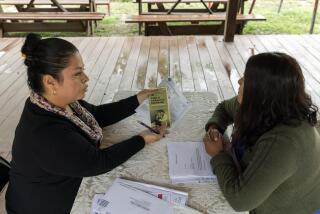Fewer Have Coverage for Health Care
WASHINGTON — The number of Americans without health insurance jumped significantly last year after declining for the previous two years, the Census Bureau reported today.
The report found a large drop in job-based health insurance, which analysts said was caused by a combination of rapidly rising health-care costs and a weak economy. Many employers who just a year or two ago needed to offer good health benefits to attract workers now are passing on higher insurance costs to their employees--or dropping coverage altogether.
“We’re getting to the point where uninsurance is not just a poor people’s problem, not just a problem of the down and out, but a middle-class problem,” said Diane Rowland, executive director of the Kaiser Commission on Medicaid and the Uninsured. The Henry J. Kaiser Family Foundation is an independent philanthropy focusing on the major health-care issues facing the nation.
The new figures show that government programs prevented a much larger increase in the number of very poor Americans without health insurance. If not for increased enrollment in Medicaid and the State Children’s Health Insurance Program, last year’s number of uninsured Americans would have been much higher.
But 41 states, including California, are planning to limit Medicaid spending in the coming year. And the outlook for private insurance is no brighter: Surveys show that more than three-fourths of employers plan to pass on more health-care costs to their workers, some of whom no longer will be able to afford their share of insurance premiums.
“This report is the beginning of bad news, but nowhere near the end,” Rowland said.
Altogether, the number of Americans who had no health coverage for any part of the year increased by 1.4 million last year to 41.2 million. The increase in the proportion of uninsured Americans, from 14.2% to 14.6%, was the largest since 1997.
Eighteen percent of Californians had no health insurance, an above-average rate that reflects the state’s large number of Latino and foreign-born residents.
The proportion of Americans with employment-related health insurance dropped a full percentage point, to 62.6%.
“That accounts for most of the change in the uninsured rate,” said Robert J. Mills, a Census Bureau statistician and author of the report.
Following a Census Bureau report released last week that showed the number of Americans living in poverty increased last year for the first time in eight years, today’s figures on the uninsured shed new light on an economy in which more Americans--from a wider range of ethnic backgrounds, income levels and employment histories--are having problems making ends meet.
The uninsured rate for Latinos, for example, remained the highest of any racial or ethnic group at 33.2%. Yet the Latino uninsured rate held steady, while the proportion of uninsured whites rose from 13.2% to 13.6%, an increase of more than 1 million people.
The proportion of African Americans without health insurance rose two-tenths of a percentage point to 19%.
And while the proportion of uninsured was highest, at 23.3%, among households with annual incomes of less than $25,000, the uninsured rate increased in every income category. The largest jump occurred in the $75,000-and-up bracket, where 7.7% lacked insurance last year.
Finally, while a job remains the strongest link to health insurance coverage, the proportion of Americans who were employed and uninsured last year grew from 16.5% to 17%.
The ranks of the uninsured held steady among workers at larger firms, but increased at businesses with fewer than 25 employees. At these small businesses, less than a third of workers had health benefits.
And the number of those who had health coverage through their own job or that of a family member dropped by 1.2 million, the first such decline since 1993.
Kate Sullivan, director of health-care policy for the U.S. Chamber of Commerce, said she was “not terribly surprised” by the large drop because “something had to give.”
Health insurance premiums for small employers have increased roughly 20% since 1999, Sullivan said, but through 2000, business owners “had to just suck it up because they really needed the workers.”
They don’t anymore. And as employers pass on more health-care costs to workers, she added, more employees are declining coverage because they cannot afford to pay their share.
Enrollment in the joint federal-state Medicaid program grew by about 7% last year to nearly 32 million people. But despite the increase in public assistance, an additional 10 million poor people had no health coverage of any kind last year.
More than 1 in 10 children still lacked health coverage, but the growth of Medicaid and the State Children’s Health Insurance Program helped hold the number of uninsured children steady at 8.5 million.
The census report also highlights the political disagreements over what, if anything, the government should do about the growth in the ranks of the uninsured.
Ron Pollack, executive director of the consumer advocate group Families USA, said the report “demonstrates that public program expansions should be enacted to increase health coverage for low-wage working adults.”
The Chamber of Commerce’s Sullivan saw new evidence in the report to support corporate America’s view that “Congress should look beyond simply adding more people to Medicaid or burdening businesses with more government mandates” that make private coverage more expensive.
Within the government, Health and Human Services Secretary Tommy G. Thompson called on Congress to pass President Bush’s proposals for tax credits to help poor families buy health insurance and a small increase in funding for community health centers.
“As this new report shows,” Thompson said in a statement, “we simply cannot afford to wait any longer ... to assist American families who lack access to health care.”
Democrats and consumer advocates argue that the president’s proposed tax credits are too small to make health insurance affordable for low-income families. They are seeking additional federal funds for cash-strapped Medicaid and children’s health programs.
But the congressional stalemate on virtually all health-care measures is unlikely to give way soon, officials agree.
Sen. Edward M. Kennedy (D-Mass.) has signaled his intention to pursue replacing the system of largely employment-based health insurance with a government-based system.
“The large increase in the already unacceptably high number of the uninsured should be a wake-up call for Congress and the president,” he said in response to today’s report. “Every American deserves affordable health care.”
*
(BEGIN TEXT OF INFOBOX)
No Health Plan
Estimated percentage of U.S. residents without health insurance in selected categories.
2000 2001
Total population 14.2 14.6
White 13.2 13.6
Black 18.8 19.0
Asian 18.0 18.2
Latino 32.9 33.2
Under 18 11.9 11.7
U.S.-born 11.9 12.2
Foreign-born 32.3 33.4
Worked full time 15.7 16.0
Worked part time 20.6 22.0
Did not work 23.8 24.7
Household income
Less than $25,000 22.8 23.3
$25,000-$49,999 17.4 17.7
$50,000 to $74,999 11.0 11.3
$75,000 or more 7.1 7.7
Source: Census Bureau
More to Read
Inside the business of entertainment
The Wide Shot brings you news, analysis and insights on everything from streaming wars to production — and what it all means for the future.
You may occasionally receive promotional content from the Los Angeles Times.










